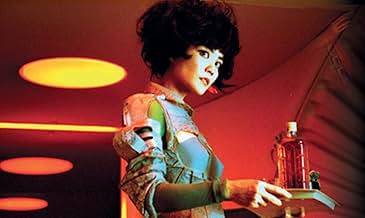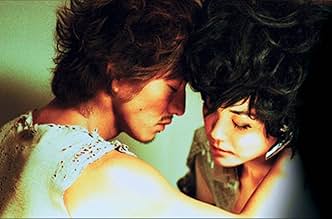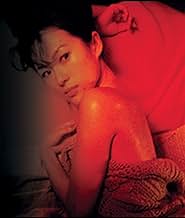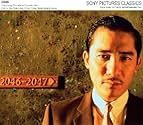Nachdem ein Science-Fiction-Autor die Frau verloren hat, von der er glaubt, sie sei die einzige wahre Liebe seines Lebens gewesen, treten andere Frauen im Laufe mehrerer Jahre in das Leben d... Alles lesenNachdem ein Science-Fiction-Autor die Frau verloren hat, von der er glaubt, sie sei die einzige wahre Liebe seines Lebens gewesen, treten andere Frauen im Laufe mehrerer Jahre in das Leben des Schriftstellers.Nachdem ein Science-Fiction-Autor die Frau verloren hat, von der er glaubt, sie sei die einzige wahre Liebe seines Lebens gewesen, treten andere Frauen im Laufe mehrerer Jahre in das Leben des Schriftstellers.
- Auszeichnungen
- 38 Gewinne & 81 Nominierungen insgesamt
- Chow Mo-wan
- (as Tony Leung)
- Wang Jie-wen
- (as Dong Jie)
- Bird
- (as Bird Thongchai McIntyre)
- Ah Ping
- (as Siu Ping-Lam)
- Party girl
- (as Sabrina Cheung)
- Dabao
- (as Ching Siu-Lung)
Empfohlene Bewertungen
At the start, the film feels episodic and disjointed, as writer/director Kar Wai Wong reveals in gradual stages the complex story he is telling. We can tell that this is a movie that will require our full and undivided attention if we hope to enter into the minds of the filmmakers and make any real sense at all out of it. But after some initial confusion, most of the early ambiguity begins to fade away as the major themes and characters come to the fore. Chow is a man who has clearly lost the love of his life and who has since been trying to come to terms with that fact in his later dealings with women. He has made a decision - whether conscious or unconscious we are never really sure - to keep women at arm's length, being willing to bed or help them but not allowing himself to enter into any permanent or meaningful relationships with them. Instead, he uses his writing to express those yearnings for true companionship that he cannot allow himself to act upon in real life.
Unlike many Chinese films, which enact their tales against expansive landscapes bathed in glorious sunlight and vibrant colors, "2046" is set in a claustrophobic world of dingy rooms and darkened hallways, with the camera almost never journeying outdoors or even pulling very far back from the actors in the frame. The effect of this is to plunge us fully into the world and minds of the characters, particularly that of Chow, whose thoughts and musings become the canvas on which the story is painted. Tony Leung Chiu Wai gives a subtle, masterful performance as do the various actresses who play the women in his life. It is his affair with Bai Ling, a beautiful prostitute who wants more out of their relationship than Chow is willing to give, that leaves the greatest mark on our heart.
There are times when the movie seems almost too fancy and showy for its own good, when the simplicity of the theme gets buried under the complexity and artiness of the filmmaker's style. But this is, for the most part, a challenging and stimulating work that moves us even when we don't fully understand it.
The novel he was writing has been a science fiction at first. Whereas, he's driven by a serendipity that the name of this novel "2046" is also the room number in which he and his ex has shared a love. Into that room, now a harlot settles in. He enriches his novel by putting himself as the true love of this harlot staying in room 2046. As destiny would have it, when the harlot meets him she really falls in love with him. By courtesy of her swallowing his bait, the novelist subjoins an erotic component into his novel. Let's gather together the first phase of the movie: We have one man and two woman. First woman left him 2 years ago, and he is still in love with her. Then at the present time, the second woman falls in love with him.
The second phase is the vengeance of the novelist from the woman he loved in 1967. This phase forms the essence of the novel: The future in the year 2046. Future is under the control of dreamers. Everybody who can dream and who can love, can travel into 2046 deep in their heart to recapture their lost memories. The novelist never goes there, 'cause he knows that if he goes once, he would never return to the present time, and would stay stuck in the future, living in the memories. Instead of making himself gone, he sends her inconstant love into 2046 as an android woman. Living as an android, the woman doesn't have a heart. But a young man falls in love with her. She yearns for him so much, but she could never express her feelings nor the look in her eyes could ever change; since she has no heart no more. She realizes that she deserves to be loved, and denies herself. She begins suffering of the love she remained lighthearted to the novelist 79 years ago. Witnessing her repentance, the novelist forgives her love; and wants her back at the present time in 1969.
At the last phase the novelist loses himself before his love finds him. Because his novel concludes to an ending which he doesn't have the love for her true love anymore, he depletes his inspirations to finish his novel without the memories of his past love. When she returns to him, he stands indifferent.
An amazing story layering ahead, including tons of short stories inside, and the director Wong Kar Wai uses a giddy and ravishing cinematography for use of symbolism. It's the viewers' duty to solve the puzzles of the storyline, to match the short stories with their attributions and to set in order of the straight-going novel versus unsteadily progressing movie; which altogether I shared with you above.
Both director and the writer of 2046, Wong Kar Wai presents a novel adaptation in the movie, and a movie adaptation in the novel; in conclusion a mixture of two arts on silver screen.
We learn from the narrator and lead character, Chow (Leung), that there is a place, if not a time, called 2046, where people don't leave unless they fall in love. But, for the bulk of the film, the film is not set in any kind of futuristic setting that might be assumed on the outset of going into the film. It's set in late 60's Hong Kong, where Chow writes lurid fantasy stories. He takes room 2046 after seeing a woman, Su (Li Gong), in the room. He feels that this place is where he, like others, can go to "lose memories" ("All memories are traces of tears", a title-card reads), which spurs him on the start writing a sci-fi novel with the room's title.
During his stay, he meets two women that effect him: an abused girl, at first acting aloof, Lulu/Mimi (Carina Lau), leaves and the later comes back in the film as a kind of writing assistant for Chow. The more significant woman, however, is in the form of call-girl Bai Ling (Zhang Ziyi, a woman so gorgeous it borders on the unreal), who like the others takes room 2047, and becomes Chow's "drinking buddy". But this soon turns to playfulness, to a side affair. Although there is much else that goes on in the film, this has some of the best material, with wonderful dialog and style giving room for perhaps th best performance I've seen from Ziyi yet.
This is not all to the film, though it could've been and been as successful. The women in Wong's films, like with Hitchcock or even Antonioni or Godard (all directors he was obviously inspired by for his own original stance), are crucial to how it turns out. These women express everything Wong desires, abandons, represses, flirts, and acts cool with. They spur on almost every one of his creative pieces (he gives a short story of 2047 to one, who wonders why the ending is so sad, to which he cannot create a happy one), and all of the things he'd rather not forget. Without the strong performances from them all, in particular Ziyi, Lau and Cheung, the drama just wouldn't be there, and certainly the style giving much weight to the film would become over-cooked and pretentious.
The style, of which, was something I took various notes of while I watched, scribbling bits, elements, colors and shots that caught my eyes: the greens in the halls, the brightness of outside on the porch, the black and white scene in the cab (one of my favorites), and of course the futuristic visualization scenes of Chow's own 2046. What's curious about the real sci-fi type scenes is that they make little sense aside from the central point- finding real love and the exile following- but the atmosphere, use of different colors and shots and film speeds (Christopher Doyle, a DP on most of Wong's films, does beautiful work all around) is unique, and basically saves a dramatically empty sequence.
There is also the question of slow-motion, which is used to much more effect than in the previous Wong films I've seen, and if it is over-used. It becomes a distraction only towards the end, when one wishes things were not TOO romanticized, but many times it is affecting, and tries to past the melodrama in some of the (above average) writing. Overall, Wong Kar-Wai displays without a shadow of doubt with 2046 that he is a master of compositions, of moods, and of creating characters that are true to themselves, who feel and love but can't seem to reach for it. But this doesn't make it an 'empty' film. If a scene missteps or something gets irksome with the style, it comes back around at the next minutes.
Several years in the making and highly anticipated, _2046_ (2004) should pacify director Wong Kar Wai's fans, at least, for its end-of-an-era feel and look. At its core, this is a decidedly (or deceptively) simple movie, in spite of its fractured and non-linear narrative. It tells the tale of an emotionally wrecked man, Chow Mo Wan (played by Tony Leung), a reprised character from Wong's critically acclaimed earlier oeuver, _In the Mood for Love (2000)_, and the many beautiful women he keeps and fails to keep, in a time-space continuance that is laden with sepia-tinted memories: a monologue, if you will, of Chow's torrid love affairs, love spats, and the ensuing heartbreaks resulting, no doubt, from the pangs of a failed liaison Chow is trying to escape. It'd appear that the failed relation with Su Lizhen (Maggie Cheung) in _In the Mood for Love_, who has a "special appearance" in this film, has changed Chow irrevocably, which is key to understanding Chow's troubled soul.
But it is not a sequel necessarily, per se, to _In the Mood for Love_. This film can still be watched on its own, though it'd certainly help if you could link moments in _2046_ to the director's earlier works, for it's laden with jumbled continuity (take the character of Lulu, for example, first seen in _Days of Being Wild (1991)_), hidden meanings (read: Neo-Godardian) and other fun stuff, sorta an insider's joke, if you dig such esoteric things. But I digress. And it's been said that this is a culmination of all the previous filmic experience of director Wong (bordering on narcissism); hence its "end-of-an-era" feel and look is duly appreciated and a point well taken.
In _2046_, Chow's isn't an easily likable character owing to the frailty and the vagaries of his own personal emotions and peccadilloes, but that makes him only human and real, and his character, believable. Take the following exchange:
Su Lizhen (Gong Li) to Chow Mo Wan (Tony Leung): Do you know my past?
Professional gambler Su (she who is of the same name as that of Maggie's character in _In the Mood for Love_) asked Chow, dissonantly, questioning the latter essentially whether there is a future for the both of them, if he cannot forget his past. And it's for the same reason, or so we're led to believe, that Bai Ling (Zhang Ziyi) is left devastated, as Chow cannot treat her any differently from the scores of other women he's seeing; hence eliciting the following memorable line from Bai which I'm sure speaks to most of us one way or another:
Bai Ling (Zhang Ziyi) to Chow Mo Wan (Tony Leung): You may not like me. But I'll like you all the same.
What fools we are made by love. :)
Contrasting Chow as a man who dwells in the past and in need of closure to move on, Tak (Kimura Takuya) isn't ambiguous when it comes to matters of the heart.
Tak (Kimura Takuya) to Wang Jingwen (Faye Wong): I do not know what your answer may be. (I dread to know.) But I need to know.
Here is a man who is not afraid to love and says his love. And he needs to know if his love is unrequited. And in seeking happiness, the message seems to be that there is no other way. Now why does this remind me of all the sorry tales with which we are all-too-familiar with men-who-cannot-commit-or-decide? :) And so the film is thusly replete with impressions of repeated variations of the same theme: the pointlessness of returning to the past. Which is why we have the following line:
Bai Ling (Zhang Ziyi) to Chow Mo Wan (Tony Leung): Why can't it be like before? (The same reason why nobody returns on the 2046 train, in Chow's sci-fi novel of the same name. Seen in this light, it is also a double-entendre for director Wong: Why can't this film be like the one before in the form of _In the Mood for Love_? Where does he go from here?)
Those familiar with Wong's earlier works will notice his signatures throughout: quick cutting, slow motion, fast motion, freeze frames, black and white, tilt shots, color filters, neon-sign lighting, aided ably by three able cinematographers. Production value of _2046_ is expectedly top-notch. Music by Shigeru Umebayashi is haunting and sets the right mood. Zhang Suping (William Chang Suk Ping) does a wonderful job in creating an enrapturing atmosphere set in the late '60s.
How great it is, in an otherwise desolate world of unease, vulnerability, hopelessness, and pathos, we have directors such as Wong to feast our senses. Highly recommended.
Wong-Kar-Wai comes back 4 years after "In the mood for love" with another refined and delicate movie, although this one has not the same strength as the previous... Because the director wants to develop too many themes (love, the power of memories, the lack of communication, the importance of living now...). "In the mood for love" was maybe more focused on a love story and the impossibility of living it. "2046" is a sort of sequel, but we don't understand very well where the director wants to lead us.
Apart from that, the film deserves to be watched because it is original, it explains that we don't have to live the future in putting there the hopes which belonged to the past, otherwise life has a wasted meaning. The film is colourful and cinematography is excellent. Very slow, yes, but a film like this one follow its own poetry, images here are much more important than words.
Wusstest du schon
- WissenswertesEach character speaks their own languages. Mr. Chow speaks Cantonese, Bai Ling speaks Mandarin, and Tak speaks Japanese, even when talking to each other. Even so, they seem to understand each other perfectly.
- Zitate
Chow Mo Wan: Love is all a matter of timing. It's no good meeting the right person too soon or too late. If I'd lived in another time or place... my story might have had a very different ending.
- Alternative VersionenChinese version is edited for sexuality in the Ziyi Zhang/Tony Leung love scenes.
- VerbindungenFeatured in Belas Artes: A Esquina do Cinema (2012)
- Soundtracks2046 Main Theme
(Percussion)
Composed and Arranged by Shigeru Umebayashi
Licensed To Virgin, EMI
(p) & © Block 2 Music Company Ltd.
Top-Auswahl
Details
Box Office
- Budget
- 12.000.000 $ (geschätzt)
- Bruttoertrag in den USA und Kanada
- 1.444.588 $
- Eröffnungswochenende in den USA und in Kanada
- 113.074 $
- 7. Aug. 2005
- Weltweiter Bruttoertrag
- 20.207.146 $
- Laufzeit2 Stunden 9 Minuten
- Farbe
- Sound-Mix
- Seitenverhältnis
- 2.35 : 1
Zu dieser Seite beitragen



































